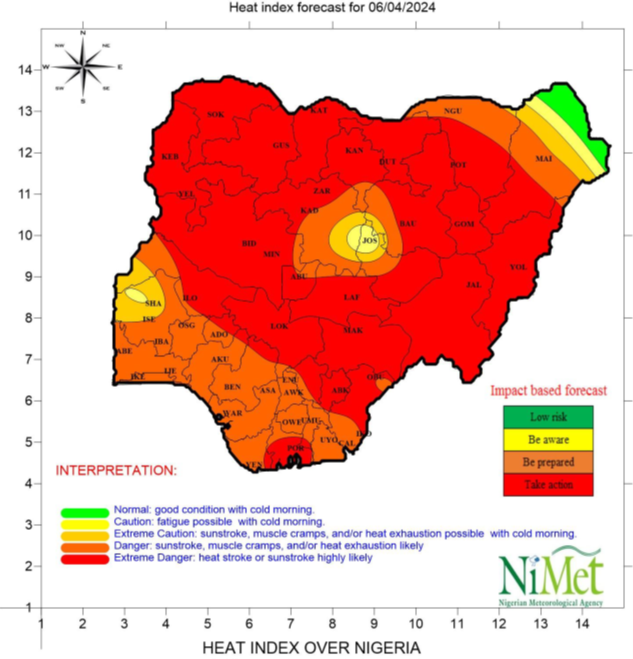As scorching temperatures continue to grip most northern states of Nigeria, the Nigerian Meteorological Agency (NiMet) has issued a dire warning to residents, urging them to take precautions to avoid heat-related illnesses.
States like Abuja, Kano, Sokoto, and Kogi are at heightened risk of experiencing extreme heatstroke on Saturday if adequate measures are not implemented.
NiMet’s warning comes as part of its “Weather Warning for Heat Stress,” which categorizes Nigeria’s 36 states and the Federal Capital Territory into five levels based on the potential for heat stress. These categories range from Normal to Extreme Danger, with most northern states falling into the latter category for Saturday.
According to NiMet, the extreme danger classification indicates that the risk of heatstroke or sunstroke is highly probable, posing significant health risks to residents. With temperatures soaring to unprecedented levels, the agency emphasizes the importance of staying vigilant and taking necessary precautions to mitigate the adverse effects of extreme heat.
Heat-related illnesses such as heat exhaustion and heatstroke can have severe consequences, particularly for vulnerable populations such as the elderly, children, and individuals with pre-existing health conditions. Symptoms of heatstroke include dizziness, nausea, rapid heartbeat, and confusion, which can escalate rapidly if left untreated.
In light of the alarming forecast, NiMet advises residents in high-risk areas to stay indoors during peak sun hours, typically between 10 a.m. and 4 p.m., when temperatures are at their highest. If outdoor activities are unavoidable, individuals are urged to wear lightweight, loose-fitting clothing, stay hydrated by drinking plenty of water, and seek shade whenever possible.
Furthermore, NiMet recommends the use of fans or air conditioning to maintain a cool indoor environment and minimize strenuous physical activity during periods of intense heat. Additionally, residents are encouraged to check on elderly neighbors, relatives, and those living alone to ensure their well-being during the heatwave.
Local authorities and emergency services have been alerted to the heightened risk of heat-related emergencies and are prepared to respond promptly to any incidents. Public awareness campaigns are also being conducted to educate communities about the importance of heat safety measures and how to recognize the signs of heat-related illnesses.
As climate change continues to exacerbate extreme weather events, including heatwaves, NiMet underscores the need for proactive measures to protect public health and safety. By raising awareness and promoting heat stress mitigation strategies, authorities aim to reduce the impact of extreme heat on vulnerable populations and ensure the well-being of all citizens, especially during periods of elevated risk.















